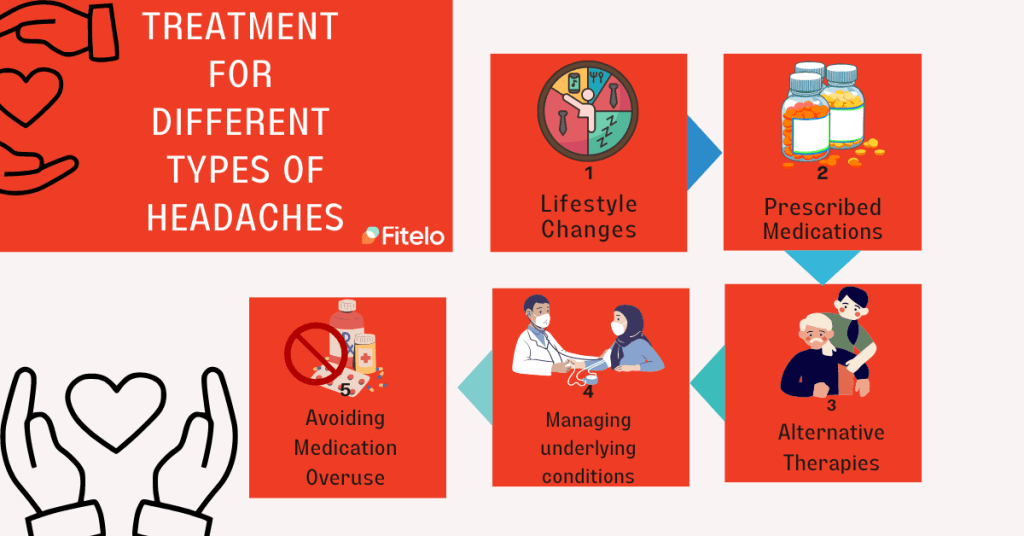
Kulcha, a mildly leavened flatbread variety, is an invention of…

Shalini has been crafting engaging stories, blogs, and articles that are into beauty, and fitness for the past 3 years.


Varleen Kaur is a Qualified Dietitian. In Fitelo, she is currently serving as a Subject Matter Expert, in the Department of Performance and Marketing.

Have you ever had a pounding headache that just won’t go away, no matter how much you try to distract yourself or take pain medication? Headaches are a common experience that most of us have had to deal with at some point in our lives, and they can be incredibly frustrating and debilitating. But did you know that there are actually different types of headaches, each with its own unique symptoms and causes? In this blog, we’ll take a closer look at the different types of headaches and what you can do to find relief. So, if you’re tired of suffering from headaches and want to learn more about this common condition, keep reading!


A headache is a common condition that most people have experienced at some point in their lives. It is a pain or discomfort in the head, scalp, or neck area that can be mild or severe, and can last from a few minutes to several days. There are different types of headaches, each with its own unique symptoms and causes. Further, we will discuss the different types of headaches and their symptoms.

1. Tension Headaches
Tension headaches are the most common type of headache. They are characterized by a dull, aching pain that feels like a band around the head. Tension headaches usually happen due to stress, poor posture, or muscle strain.
2. Migraine
Migraine is a type of headache that is often accompanied by other symptoms such as nausea, vomiting, and sensitivity to light and sound. Migraines can be very debilitating and can last for several hours or even days. The exact cause of migraines is not known, but they are believed to be caused by changes in the brain and genetics. Here is a detailed guide on migraine for you that can help you understand better:
3. Cluster Headaches
Cluster headaches are a rare type of headache that occurs in cyclical patterns or clusters. They are usually very severe and occur on one side of the head, often around the eye. Cluster headaches are more common in men than women.
4. Sinus Headaches
Sinus headaches reason is by inflammation in the sinuses, which can be caused by allergies or infections. The pain is usually in the forehead and cheeks along with other symptoms such as congestion and fever.
5. Rebound Headaches
Rebound headaches are caused by the overuse of pain relievers such as aspirin or ibuprofen. They occur when the medication wears off, causing the headache to return.
The symptoms of headaches can vary depending on the type of headache you are experiencing. Here are some of the most common symptoms of different types of headaches apart from 5 mentioned above :
It’s important to note that these symptoms can also be due to other health conditions, so it’s best to seek medical advice if you experience frequent or severe headaches. Your healthcare provider can help determine the cause of your headaches and recommend an appropriate treatment plan.
Headaches may also be due to a variety of other factors, including
These causes are less common but may require medical attention.
However, it’s important to note that not all headaches have a specific cause, and sometimes the cause may be difficult to identify. Also, if you are experiencing frequent or severe headaches, it’s important to seek medical advice from your healthcare provider. Moreover, they can help determine the cause of your headaches and recommend the most effective treatment plan for you.
Diagnosing a headache typically involves a medical evaluation by a healthcare provider. Here are the steps involved in diagnosing a general headache:
However, it’s important to seek medical advice if you experience frequent or severe headaches, as this can help identify the cause and determine the most effective treatment plan for you.
The treatment of headaches depends on the underlying cause and the type of headache you are experiencing. Here are some general strategies that may be helpful in managing headaches:

It’s important to work with your healthcare provider to develop a treatment that is for your individual needs. They can help identify the underlying cause of your headaches and recommend the most effective treatment strategies for you.
Preventing headaches depends on the underlying cause and the type of headache you are experiencing. Here are some general strategies that may be helpful in preventing headaches:
In conclusion, headaches are a common condition that can be caused by a variety of factors. Understanding the different types of headaches and their symptoms can help you identify the cause and find an appropriate treatment. If you experience frequent or severe headaches, it is important to consult a healthcare provider for proper diagnosis and treatment.
Marium was overweight, unhealthy, and unhappy. But Marium was ready to make a change and get her life back on track. Marium, a working professional from Ontario, Canada reached out to Fitelo after getting to know about the Fitelo obesity diet plan and how it tackles stuck weight issues. She started slow but steadily worked her way up, and now we are proud to say that Marium has lost a total of 22 kgs in 180 days!
A: Headaches can take place due to a variety of factors, including stress, poor posture, muscle tension, dehydration, lack of sleep, allergies, hormonal changes, and certain medical conditions.
A: However, the four different types of headaches include tension headaches, cluster headaches, sinus headaches, and rebound headaches.
A: However, the common symptoms include pain or pressure in the head, sensitivity to light or noise, nausea, vomiting, and fatigue.
A: Headaches are typically diagnosed based on a physical examination and a review of the patient’s medical history. In some cases, additional tests such as a CT scan or MRI may be ordered to rule out underlying medical conditions.
A: Headaches can be prevented by maintaining a healthy lifestyle, staying hydrated, managing stress, getting enough sleep, and avoiding triggers such as certain foods.
A: However, in rare cases, headaches can be a symptom of a more serious medical condition such as a brain tumor or aneurysm. It’s important to seek medical attention if you experience severe or persistent headaches.
A: Yes, children can get headaches. Tension headaches are the most common type of headache in children, but migraines and other types of headaches can also occur.
A: Yes, lifestyle changes such as getting enough sleep, staying hydrated, managing stress, and avoiding triggers can help prevent headaches.
A: Yes, certain foods and drinks such as caffeine, alcohol, chocolate, and processed foods can trigger headaches in some people. Keeping a headache diary can help identify potential triggers.
A: Yes, regular exercise can help prevent headaches by reducing stress and tension and improving overall health.


Fun Fact
Today’s weight loss story is of Harpreet, who was suffering from acute acidity and migraine and was taking 17-18 pills a day. She was determined enough to get better and start living a healthy lifestyle. Fitelo worked with her to provide her with the right guidance. We are so proud of Harpreet. In just 100 days she had lost 9 kg. Harpreet is an inspiration for others. Hence, a good diet plan is a solution to all your health problems.
Contact Us Today
We understand it is a bit tricky which diet plan will work for you and which will not, it can be complicated and confusing, hence you need to consult a professional. So, contact us today if you are looking for a customized diet plan or any diet plans, and we will help you fulfill your new year’s resolution.
Disclaimer
This blog post was written to help you to make healthy and better food choices altogether. So, be aware and take care. The important thing to consider is your own health before starting a diet that is restrictive. Always seek advice from a doctor/dietitian before starting if you have any concerns.
Eat Healthy, Live Healthy. Enjoy a long happy life.

Kulcha, a mildly leavened flatbread variety, is an invention of…
.png) Whatsapp Us
Talk To An Expert
Whatsapp Us
Talk To An Expert